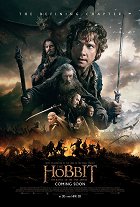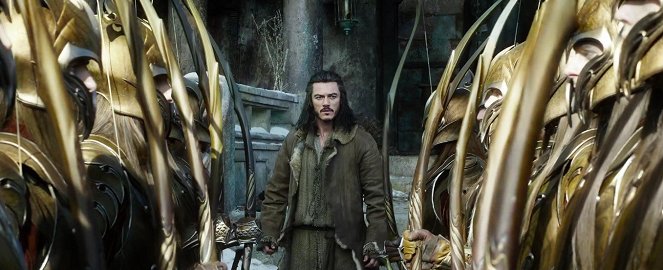Director:
Peter JacksonCámara:
Andrew LesnieMúsica:
Howard ShoreReparto:
Martin Freeman, Ian McKellen, Richard Armitage, Luke Evans, Evangeline Lilly, Orlando Bloom, Hugo Weaving, Cate Blanchett, Christopher Lee (más)Streaming (4)
Sinopsis(1)
El Hobbit: La batalla de los cinco ejércitos supone el épico final de las aventuras de Bilbo Bolsón, Thorin Escudo de Roble y la Compañía de los Enanos. Cuando reclamaron su patria al dragón Smaug, la Compañía desató sin querer una fuerza malvada en el mundo. Furioso, Smaug descarga llamaradas de ira sobre los habitantes indefensos de Ciudad del Lago. Thorin, consumido por la obsesión de reclamar su tesoro, sacrifica la amistad y el honor para conseguirlo mientras los frenéticos intentos de Bilbo por hacerle entrar en razón llevan al Hobbit a tomar una decisión arriesgada y peligrosa; pero las amenazas que les esperan son aún mayores. Sauron, el mayor adversario de todos, ha enviado legiones de orcos a un ataque furtivo en la Montaña Solitaria sin que nadie se entere, salvo el mago Gandalf. A medida que el mal se cierne sobre su creciente conflicto, las razas de los Enanos, los Elfos y los Hombres tienen que decidir si aúnan sus fuerzas o se abandonan a la destrucción. De repente, Bilbo tiene que luchar por su vida y la de sus amigos en la épica Batalla de los cinco ejércitos, mientras el futuro de la Tierra Media pende de un hilo. (Warner Bros. España)
(más)Videos (21)
Reseñas (14)
En el aspecto técnico vuelve a estar muy a la altura, pero en cuanto al contenido tiene muchas carencias. Muchas escenas parecen extrañamente acortadas (como si se hubiera eliminado una media hora de tomas), a otras les falta tensión, suficiente dramatismo o profundidad emocional. Las secuencias de acción y batalla son increíblemente exageradas y absurdamente irreales porque ignoran descaradamente las leyes de la física, la lógica y la probabilidad. Muchas de ellas, con su estilización locamente maníaca, recuerdan más a una comedia grotesca, y desesperadamente no encajan en una fantasía épica seriamente concebida al estilo de El Señor de los Anillos y sin querer provocan risas, que, combinadas con diálogos estériles sobre el amor, la amistad y el honor, hace que la película final de El hobbit sea sin duda alguna la más estúpida de la trilogía. Desgraciadamente, la batalla titular de los cinco ejércitos fracasa con el hecho de que los orcos no dan miedo en absoluto, y su ejército de cien mil hombres armados hasta los dientes tampoco da la impresión de ser una amenaza peligrosa, sino que más bien cumple la función de figuritas semidivertidas que se caen cuando las tocas. Y el inestable secuaz del alcalde como personaje cómico no sirve para nada. Como resultado, es más una decepción: esta vez no hay «wow» y, en cambio, se hunde en las aguas de la mediocridad. Aun así, admito que me divertí, sólo que de una forma muy diferente a como lo hice con las dos películas anteriores o con El Señor de los Anillos, pero eso no me dio ninguna alegría. Después de El Retorno del Rey grité «¡Gloria!» tres veces, pero ahora me falta una razón de peso para hacerlo.
()
The finale of The Hobbit did not satisfy me as much as I would have liked. The return to Middle Earth is nice, but from the very beginning it is clear that the creators wanted to squeeze so much in these two and a half hours that they didn’t know where to begin. They get rid of the dragon already in the opening credits and then a completely different story unfolds, which has nothing to do with the original Hobbit. I’m not blaming them for this, but I would’ve preferred if there were only two Hobbit movies and this one was conceived as a separate story. Especially since I don’t believe this is the creators’ last trip to Middle Earth. From the video logs I’ve seen, I’d say this is the best filmmaking crew ever. Everything here was running without a hitch – from the janitors to the director. What doesn’t work as perfectly is how they’re stretching this movie out, despite the fact it focuses on a single battle. That’s why I’m unwilling to give this the full amount of stars and why the second instalment remains the best movie of this trilogy in my opinion. On the other hand, the fairytale-like quality, the fact that almost everybody here is likeable and the opportunity to take another trip to Middle Earth mean a lot to me, so I am going to remember this trilogy with fondness.
()
The fact that I’m giving it one more star than the second part it’s not due so much to a better quality, but rather to the better mood I was in while watching it. Or maybe it was the more reasonable run, I don’t know. A plus is Thorin’s momentary episode of madness, a negative, is once again, the digital mess. Bilbo floats with the plot, the battle of the five armies breaks down into individual fights, and as a whole it goes nowhere. Once again I must say that adapting “The Hobbit” as a film trilogy was a very bad decision.
()
Poor Peter Jackson, if this film had come out 10 or 13 years ago, everyone would have been gushing over an unparalleled foray into the fantasy genre, but today's audiences are already spoiled by the cinematic attractions of recent years (and rightly so) and CGI effects, however sophisticated, can no longer impress anyone. But I can still feel that playful Peter in there, the 14 year-old kid who would get cyclops moving and trow a spear with photo-montage. I can still see the overgrown kid in who likes to show off, like in his movie beginnings. And I like that. Moreover, as with the Ring Trilogy, the visuals were handled by Tolkien's illustrators John Howe and Alan Lee, so I have nothing to complain about in that respect either. The Hobbit doesn't match the previous trilogy emotionally, but nobody could have expected that with the source material, which is an easygoing fairytale that doesn't solve anything, and I appreciate all the more that Jackson did manage to squeeze some of those fateful emotions into it. Still, unlike the previous two parts, I’m not giving it 5 stars. While the Hobbit's quest was entertaining and engaging thanks to the frequent changes of scenery and encounters with creatures of all sorts, here we basically don't move from where we are, there is more empty filler than necessary and you can also see how the narrative has been brutally chopped up. This policy of the studios (release a shorter cut in cinemas and a half-hour longer one on Blu-ray and make more money out of it) really annoys me. However, when I sum it up and count the pros and cons, I can safely say that although the Hobbit trilogy is not equal to the Ring trilogy in my eyes, it’s still a few thousand Smaug’s Tails ahead of the rest of the fantasy competition.
()
Spoilers ahead. You can’t take a film without an active protagonist, a strong antagonist and a sense of drive and turn it into a thrilling spectacle – not even if you have a dwarf riding a giant pig. It perhaps couldn’t have been any better thought out, but by dispensing with the trilogy’s most charismatic bad guy in the prologue, Jackson deprives the film of a more substantial final confrontation (and the effort to bring Smaug back into the film at least in Thorin’s hallucinations and Bilbo’s flashback doesn’t help much, since it’s obvious that neither of them will yield to the illusion of the dark side and they will both ultimately do the right thing). Though Bilbo’s transformation from a coward deprived of his domestic comforts has been satisfactorily completed (he acts on his own initiative, not only defying Thorin and Gandalf, but refusing to be controlled by the Ring), but during the battle he is still assigned to the role of a mere war correspondent and – as in the book – is unconscious through much of the battle. The sidelining of the hobbit also has a negative effect on the epilogue, which too briefly recapitulates the motif of the lost home and leaves us unsure of the way in which the adventures that the halfling experienced have changed him (has he become an even bigger homebody or has he realised that his home is not the only asset that he possesses?). Although The Battle is the shortest part of the trilogy, it most clearly shows us how much time Jackson allowed himself to tell the hobbit’s story (and leave the beloved Middle Earth). We are held in anticipation of the coming battle, which, however, serves primarily to draw our attention away from the lack of supporting or sufficiently developed storylines. For what purpose do Tauriel and Legolas journey to Gundabad? How does the Necromancer/Sauron contribute to the overall story (other than briefly entertaining Gandalf and creating a rickety donkey bridge to the Lord of the Rings)? What will become of Bard and his family? What was Gandalf’s (dramaturgical) contribution at the Lonely Mountain? It often seems that the flitting between the numerous characters and their personal quests serves only for forced parallels between the “old” and “new” trilogies. At the same time, it is an indication of the generally unfocused nature of the third Hobbit film. Several stories of individual characters clash in the film due to their incongruous natures (from slapstick to horror to heroic epic to intimate bromance), which make it hard to imagine that the whole film isn’t merely a matter of waiting for the battle (like the previous film “wasn't” just a matter of waiting for the dragon). The synthesis of these micro-episodes during the battle does not come across as a logical outcome of the preceding events, but rather as a case of “I happened to be passing by, so I joined in”. I found the inclusion of giant worms (if I remember correctly, no one even fights with them in the end) and eagles, which for Jackson are becoming a trademark similar to John Woo’s doves, to be equally random. What definitely doesn’t work, due to the weak development of the supporting characters, is the emotion displayed over the deaths of the less important dwarves (all except Thorin). I honestly cannot say which of them lived to see the end. What Jackson continues to excel at are the narrative action scenes that, despite tonnes of CGI and distinctly video-game “choreography” (Legolas skipping across falling rocks), radiate his enthusiasm for craftsmanship and inventing fantastical worlds and nations. Other than the two additional endings, The Battle of the Five Armies doesn’t offer any value added. It’s not a cheap, stupid or sloppily made film. It is a satisfactory film. Was it naïve to expect anything bolder from the conclusion of a perilously expensive fantasy project? 75%
()
(menos)
(más)



Anuncio